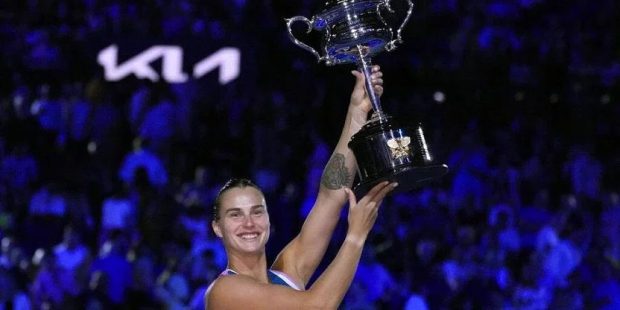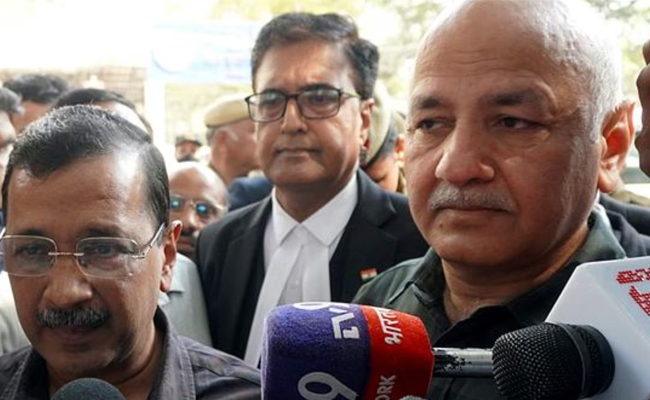Melbourne, Jan 28: Aryna Sabalenka scripted a brilliant comeback to win her maiden Australian Open singles title after defeating Jelena Rybakina in the final on Saturday.
Aryna Sabalenka, a 24-year-old from Belarus, who won her first Grand Slam title by coming back to beat Wimbledon champion Rybakina 4-6, 6-3, 6-4 at Melbourne Park on Saturday night, using 17 aces among her 51 total winners to overcome seven double-faults.
It was telling that Sabalenka's remarks during the post-match ceremony were directed at her coach, Anton Dubrov, and her fitness trainer, Jason Stacy she referred to them as "the craziest team on tour, I would say."
"We've been through a lot of, I would say, downs last year," said Sabalenka, who was appearing in her first major final. "We worked so hard and you guys deserve this trophy. It's more about you than it's about me."
Now 11-0 in 2023 with two titles already, she is a powerful player whose most glowing strength was also her most glaring shortfall: her serve. Long capable of hammering aces, she also had a well-known problem with double-faulting, leading the tour in that category last year with nearly 400, including more than 20 apiece in some matches.
After much prodding from her group, she finally agreed to undergo an overhaul of her serving mechanics last August. That, along with a commitment to trying to stay calm in the most high-pressure moments, is really paying off now.
The only set she has dropped all season was the opener on Saturday against Rybakina, who eliminated No. 1 Iga Swiatek in the fourth round.
But Sabalenka turned things around with an aggressive style and, importantly, by breaking Rybakina three times, the last coming for a 4-3 lead in the third set that was never relinquished.
Still, Sabalenka needed to work for the championship while serving in what would be the last game, double-faulting on her initial match point and requiring three more to close things out.
When Rybakina sent a forehand long to cap the final after nearly 2 1/2 hours, Sabalenka dropped to her back on the court and stayed down for a bit, covering her face as her eyes welled with tears.
Sabalenka was 0-3 in Grand Slam semifinals until eliminating Magda Linette in Melbourne. Now Sabalenka has done one better and will rise to No. 2 in the rankings.
As seagulls were squawking loudly while flying overhead at Rod Laver Arena, Rybakina and Sabalenka traded booming serves. Rybakina's fastest arrived at 121 mph (195 kph), Sabalenka's at 119 mph (192 kph). They traded zooming groundstrokes from the baseline, often untouchable, resulting in winner after winner.
"Hopefully," Rybakina said afterward, "we're going to have many more battles."
The key statistic, ultimately, was this: Sabalenka accumulated 13 break points, Rybakina seven. Sabalenka's trio of conversions was enough, and the constant pressure she managed to apply during Rybakina's service games had to take a toll.
Sabalenka had been broken just six times in 55 service games through the course of these two weeks, an average of once per match. It took Rybakina fewer than 10 minutes of action and all of two receiving games to get the measure of things and lead 2-1, helped by getting back one serve that arrived at 117 mph (189 kph).
A few games later, Sabalenka returned the favor, also putting her racket on one of Rybakina's offerings at that same speed. Then, when Sabalenka grooved a down-the-line backhand passing winner to grab her first break and pull even at 4-all, she looked at Dubrov and Stacy in the stands, raised a fist and shouted.
In the next game, though, Sabalenka gave that right back, double-faulting twice including on break point to give Rybakina a 5-4 edge. This time, Sabalenka again turned toward her entourage, but with a sigh and an eye roll and arms extended, as if to say, "Can you believe it?"
Soon after, Rybakina held at love to own that set.
Sabalenka changed the momentum right from the get-go in the second set. Aggressively attacking, she broke to go up 3-1, held for 4-1 and eventually served it out, fittingly, with an ace on a second serve, no less.
Sabalenka acknowledged ahead of time that she expected to be nervous. Which makes perfect sense: This was the most important match of her career to date.
And if those jitters were evident ever-so-briefly early she double-faulted on the evening's very first point and appeared to be resurfacing as the end neared, Sabalenka controlled them well enough to finish the job.
Let the Truth be known. If you read VB and like VB, please be a VB Supporter and Help us deliver the Truth to one and all.
Singapore (PTI): An Indian-origin Malaysian man was sentenced in Singapore to 12 years' jail and 12 strokes of the cane for raping a domestic worker outside a train station after tricking her into thinking that he was a police officer.
Sharveen Chetty, 48, pleaded guilty on February 4 to one charge of raping the 35-year-old Indonesian woman in the bushes outside Exit F of a subway, Little India Mass Rapid Transit station, at about 8pm on July 11, 2022.
The victim was with her friends at the time, but Chetty lured her away before he sexually assaulted her, according to a report by The Straits Times on Thursday.
Two other charges – a second rape charge and a charge of impersonating a police officer – were taken into consideration during sentencing on Wednesday.
The witnesses who testified on the first day of the trial included a doctor from Women’s and Children’s Hospital who examined the victim a day after the rapes, and forensic scientists from the Health Sciences Authority.
Chetty had initially contested the charges in a High Court trial that began on February 3. But he changed his mind and pleaded guilty on what would have been the second day of the trial, according to the daily report.
In sentencing, Justice Dedar Singh Gill considered it aggravating that Chetty had targeted the victim because she was a foreigner who might be unfamiliar with the local authorities.
The judge rejected the defence's arguments that the rape was not premeditated.
The judge, however, noted that Chetty had pleaded guilty before the victim and key prosecution witnesses testified, thus sparing her and her friends from going through cross-examination.
The prosecution had sought a sentence of between 11 and 13 years’ jail and 12 strokes of the cane, noting Chetty’s extensive efforts to disguise himself, and his predatory act of leading the victim away from the rest of the group.
Chetty admitted that he became sexually attracted to the victim.





